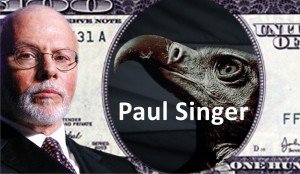The extraordinary influence hedge funds can sometimes have on markets was on full display recently when a small number of hedge funds and some individual investors together forced the sovereign South American country Argentina, with a population of almost 42 million people, to default on its debt commitments. The group led by US hedge fund Elliott Capital Management stood firm on its demand for full payment on its loans to the sovereign nation and won backing from the top US court after a series of lawsuits forced the Argentinian government to either pay the group in full or face default.
Origins of the Dispute
 Argentina’s current crisis with debt has its roots in 2001 when the country defaulted on more than $80 billion of debt. The country, however, managed to persuade a vast majority of its bondholders to take a cut of approximately 70 percent on the amount they were owed and restructured its loans. Those investors who agreed to the cut and exchanged their original bond agreements for the new ones are commonly referred to as exchange bondholders.
Argentina’s current crisis with debt has its roots in 2001 when the country defaulted on more than $80 billion of debt. The country, however, managed to persuade a vast majority of its bondholders to take a cut of approximately 70 percent on the amount they were owed and restructured its loans. Those investors who agreed to the cut and exchanged their original bond agreements for the new ones are commonly referred to as exchange bondholders.
However, a small group of investors which included NML Capital, a subsidiary of the New York based Elliott Capital Management, and a smaller hedge fund named Aurelius Capital Management, as well as some private individual investors refused the amended terms and took Argentina to court. This group of investors is referred to as holdouts, and as per the court ruling Argentina currently owes the group over $1.5 billion in principal and interest.
Hedge Funds Force Second Default
The holdout group was led by billionaire hedge fund manager Paul Singer whose relentless pursuit to demand full payment put the sovereign nation on the spot. Singer, age 69, is driven by his worldview in his crusade against Argentina. He is a Republican donor but has strong libertarian leanings.
Widely followed fellow hedge fund manager Daniel S. Loeb, who himself has launched several high profile campaigns to impose his view on companies, is all praise for Singer. “He doesn’t get into fights for the sake of fighting. He believes deeply in the rule of law and that free markets and free societies depend on enforcing it,” says Loeb of Singer.
Singer’s Elliot Capital now manages over $23 billion and has returned an average of 14 percent a year since its founding in 1977. The fund has in the past won similar cases against other sovereign nations and managed to obtain payments through court orders from countries such as Peru and Congo-Brazzaville. People familiar with the fund say that its bets on suing governments make only a small proportion of its portfolio.
The US court ruling has virtually brought the case to a stalemate. The ruling prevents Argentina from making interest payments totaling $539 million to exchange bondholders who agreed to restructured loans of approximately $23 billion without first paying in full the approximately $1.5 billion owed to the holdout group. The court ruled that such payments will be deemed illegal.
Difficulties in Paying the Holdout Hedge Fund Group
At first the outstanding loan amount of $1.5 billion owed to the holdout group may seem insignificant, given that Argentina has foreign exchange reserves of approximately $30 billion. But paying the holdout group would lead to a larger problem as a clause in its restructured debt agreement prohibits the country from offering anyone a better deal than what the restructured creditors received, unless they also get the same deal.
As a result, paying the holdout group its full due of $1.5 billion would force the country to extend the same deal to the remaining 93 percent of investors who participated in its debt restructuring. This would in turn would trigger claims of more than $120 billion – which the country does not have.
However, this prohibiting clause is set to expire at the end of this year and according to Lutz Roehmeyer, a fund manager at LBB Invest in Berlin, a solution to the holdout group is likely only after this clause expires.
Relevance to Job Market
This case of hedge funds taking on a large sovereign nation is an exception, but it brings to the fore the active aggressive investment style of a typical hedge fund, characterized by calculated risk taking following rigorous due diligence. On the contrary, most mutual funds are passive investors and spread their investments across a large number of companies to minimize volatility. Most hedge fund managers have significant portion of their personal wealth invested in the fund which provides the drive to come up with creative ways to generate big profits.
Commenting on the legal wrangle, Columbia University professor and economist Joseph E. Stiglitz warns that the issue is not just about Argentina. He says Singer and Elliott have already done a lot of damage and adds that their tough posture will extend the economic misery of other over-indebted countries. This extraordinary ability of hedge funds to influence financial markets and other outside forces is often a factor that attracts top talents to this profession.
{ Comments on this entry are closed }





